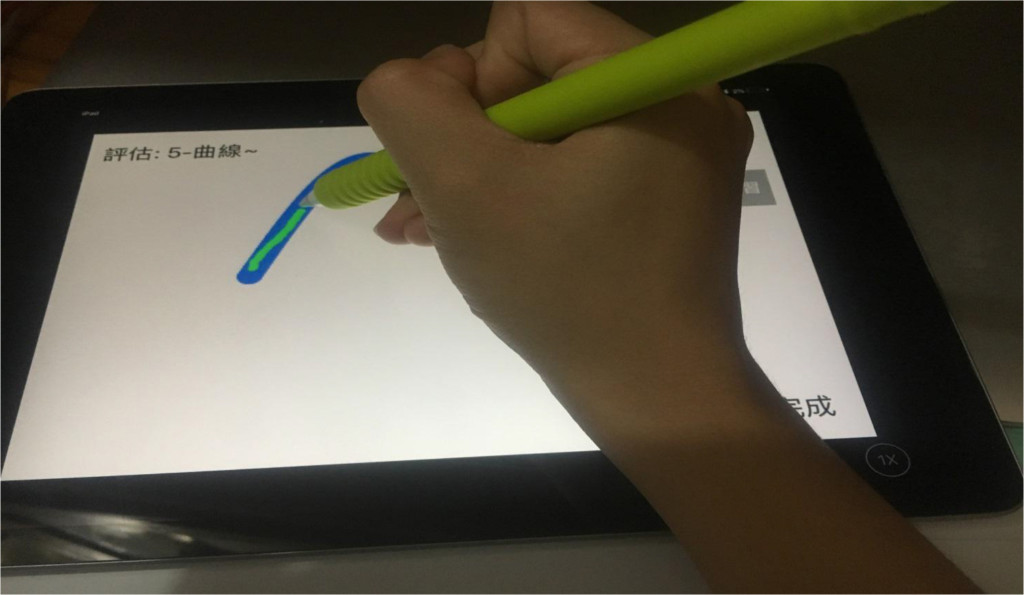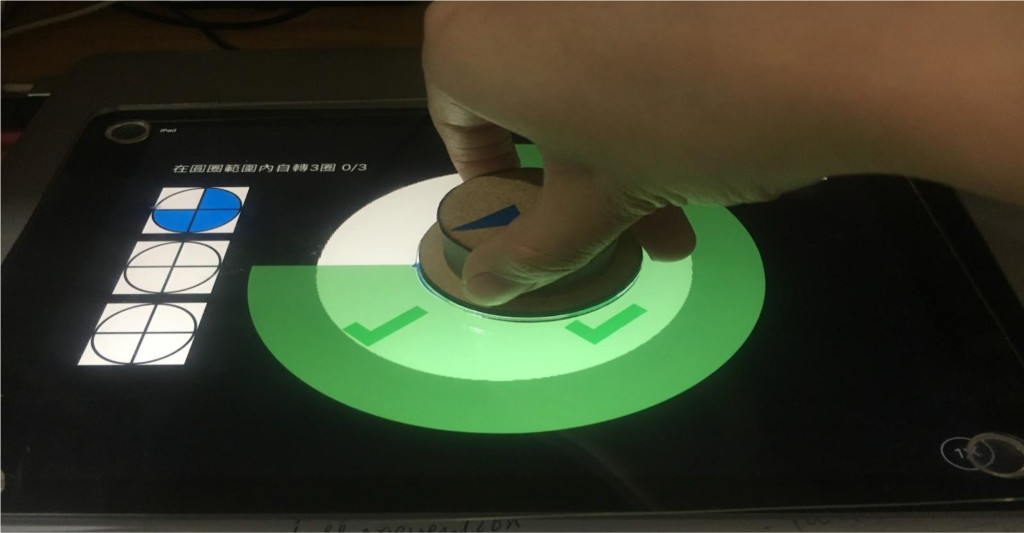Abstract
Fine motor control is important for object manipulation in daily living. Children with developmental delay, cerebral palsy or congenital upper limb abnormalities may have fine motor deficits. In recent years, digital platform for cognitive and motor assessment has been introduced to the field of health and education to optimize development in early childhood. In this study, content validity and construct validity of a new instrument named iDevChild (a tablet application) were evaluated. The iDevChild is a prototype of fine motor test in digital platform. Four occupational therapists were recruited to review the content validity of the test items of iDevChild. Twenty-five typically developing children were recruited from three kindergartens to receive two clinical fine motor tests and two subtests of iDevChild. All of the children were able to complete these tests successfully. Moderate and significant correlations were found between the scores of the tests. Further study on other subtests (e.g. bilateral coordination) and the reliability of the tool with larger sample size is recommended.
Keywords
Fine Motor, Instrument, Digital Platform, In-Hand Manipulation, Visual Motor Integration, Children
Introduction
Fine motor control is important for object manipulation in daily living (e.g. buttoning, screwing a bottle or drawing with a pencil). Fine motor skills include reaching, grasping, visual motor integration, in-hand manipulation and bilateral coordination [1]. Children with developmental delay, cerebral palsy or congenital upper limb abnormalities may have fine motor deficits. Most of the fine motor assessment batteries for young children are rated by examiner according to the assessment criterion. In recent years, digital platform for cognitive and motor assessment has been introduced to the field of health and education to optimize development in early childhood [2]. The digital platform with standardized procedures can help the health care professionals to collect reliable data and to reduce the cost (e.g. time and money) in administration of the test and training. The current study examined the applicability of a prototype of digital platform to evaluate fine motor control in children aged from 3 to 6 years old.
Material and Method
The digital platform of fine motor assessment applied in this study is named iDevChild (Innodimension, Hong Kong). The iDevChild is a tablet application (App) offering assessment and training of fine motor skills. Its subtests of fine motor assessment are: visual motor integration, in-hand manipulation and bilateral coordination. The examinee is required to follow the standardized procedures of each test item. By using a tablet and associated accessories (e.g. touch screen pencil and conductive rotational knob), performance of the examinee can be recorded and then uploaded to the Cloud. For instance, one of the test items of visual motor integration requires the examinee to draw within boundary (figure 1). The speed of completion and the area out-of-boundary could be retrieved from the report in form of CSV file. Another test item of in-hand manipulation requires the examinee to rotate a rotational knob for 3 consecutive times of 360 degree, and visual feedback on the extent of completion of the task will be shown to the examinee on the screen of tablet (figure 2). The speed of rotation and the number of time of releasing the rotation knob would be stated on the CSV file. Other than obtaining quantitative data, clinician can download a file from the Cloud to review the performance of the examinee.
In this study, content validity and construct validity of two subtests of iDevChild (visual motor integration and in-hand manipulation) were evaluated. To examine the content validity, a panel of 4 experts (occupational therapists) was interviewed. They completed a questionnaire of a 5-point Likert scale (totally agree = 5; strongly agree = 4; agree = 3; disagree = 2; strongly disagree = 1) to rate the representativeness and relevance of the test items of iDevChild. The panel members were also required to comment on the feasibility of applying the tool on children aged from 3 to 6 years old. For the construct validity, correlations between the scores of iDevChild and two clinical fine motor tests (Hong Kong Preschool Fine Motor Screening Test and Beery-Buktenica Developmental Test of Visual-Motor Integration–Sixth Edition) were examined. In this study, 25 typically developing children were recruited from 3 kindergartens. Informed consent form from their parents were obtained prior to the study. The children completed all the tests within 60 minutes in two or more sessions. Short breaks were offered between the sessions to avoid physical and mental fatigue of the children.

Figure 1. Subtest item of visual motor integration: Drawing within boundary.

Figure 2. Subtest item of in-hand manipulation: Rotation.
Results
There are several key findings. First, the area of out-of-boundary (test item of visual motor integration of iDevChild) had significant negative correlation with age, the score of Hong Kong Preschool Fine Motor Screening Test and the score of Beery-Buktenica Developmental Test of Visual-Motor Integration (correlation coefficients, rs ≥ –0.55; ps < .01). Second, the number of times of releasing the rotation knob (test item of in-hand manipulation reflecting the angle of rotation) of iDevChild had significant negative correlations with age and the score of the Hong Kong Preschool Fine Motor Screening Test (rs ≥ –0.55; ps < .01). Third, the expert panel members responded positively toward the feasibility of the iDevChild in evaluating the fine motor control of the young children. All the children were able to complete the test items of the iDevChild successfully.
Discussion and Conclusion
Older children and children having better performance in the clinical fine motor tests were found to perform better in iDevChild (subtests of visual motor integration and in-hand manipulation). These findings showed that the iDevChild has similar construct to the clinical fine motor tests. The iDevChild is a prototype of fine motor assessment tool in digital platform. By using tablet accessories, accurate assessment results and big data on fine motor performance of children could be obtained. It may provide a new way of measurement for in-hand manipulation since there is limited current evaluation tools in addressing in-hand manipulation of young children.[3] Furthermore, clinician can evaluate the fine motor control of client remotely through the digital platform. It may be applicable to other age group (e.g. adult or elderly) or clinical condition (e.g. before or after receiving hand surgery). This may foster the delivery or monitoring of health care service in remote area. In this study, we examined the content validity and construct validity of two subtests (visual motor integration and in-hand manipulation) of iDevChild on 25 children only. Further study on other subtests (e.g. bilateral coordination) and the reliability of the tool with larger sample size is recommended.
Acknowledgement
We would like to thank the children, schools and occupational therapists for their participation in this project. We are thankful to Dr. Vincent Lau and the staff of Innodimension for their technical advice and material support to this project.
Funding
The travelling expenses of researchers in this project are partially sponsored by Department of Rehabilitation Sciences, The Hong Kong Polytechnic University.
References
- Siu AMH, Lai CYY, Chiu ASM, Yip CCK (2011) Development and validation of a fine-motor assessment tool for use with young children in a Chinese population. Res Dev Disabil 32: 107–114. [Crossref]
- Pitchford N, Outhwaite LA (2016) Can touch screen tablets be used to assess cognitive and motor skills in early years primary school children? A cross-cultural study. Front Psychol 7: 1666. [Crossref]
- Raja K, Katyal P, Gupta S (2016) Assessment of in-hand manipulation: Tool development. International Journal of Health & Allied Sciences 5: 235–246.